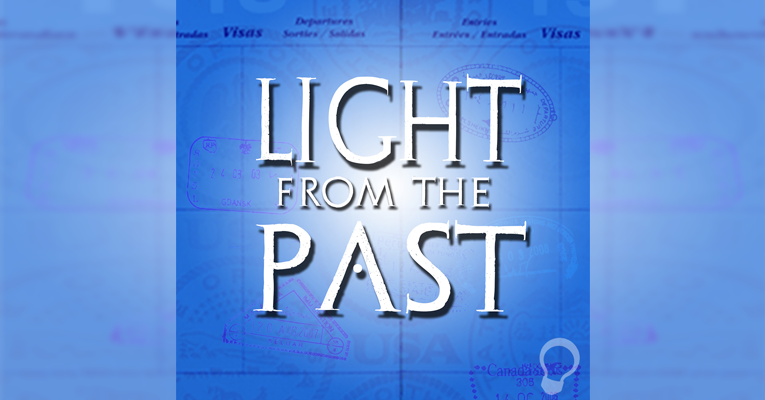
Podcast: Play in new window | Download

Monday, September 15, 2014
“Absolute Truth”
Previous Episodes
Subscription Links
Episode Transcript:
You’re listening to The New You, the daily broadcast for people who have been made new by the blood of Christ. I’m Robert Hatfield, and here is today’s Scripture:
Pilate therefore said to [Jesus], “Are You a king then?” Jesus answered, “You say rightly that I am a king. For this cause I was born, and for this cause I have come into the world, that I should bear witness to the truth. Everyone who is of the truth hears My voice.” Pilate said to Him, “What is truth?” (John 18:37-38a)
Now there’s a question that many people are asking today in one form or another. I think the search for truth is common to all of mankind. Unfortunately, some people are being fed the wrong answers by our culture.
We live in an age of relativity. Our culture says that there is no such thing as an absolute truth, that is, truth that is true regardless of any other circumstances. Instead, truth is alleged to be relative. The New American Oxford Dictionary defines “relative” as that which is “considered in relation or in proportion to something else; existing or possessing a specified characteristic only in comparison to something else; not absolute.”
It is that relative mindset that causes people to say things like, “There are no absolutes.” Or, “No one really knows what the truth is.” Or, “It’s wrong for you to impose your morals on me.” Essentially, our culture claims that everyone can believe whatever they want.
As you know, this view of relativity is impacting our modern religious culture. In their book Surveying the Religious Landscape: Trends in U.S. Beliefs, George Gallup, Jr and D. Michael Lindsay say that
[m]ore Americans are moving toward an interpretation of the Bible as a book of fables, history, and moral precepts. …Attempts at demythologizing the Bible that have been ongoing in the academy for years seem to be moving more and more from the classroom to the pews…. As recently as 1963, two persons in three viewed the Bible as the actual word of God, to be taken literally, word for word. Today, only one person in three still holds to that interpretation (1999, p. 36).
Gallup and Lindsay indicate, as you may have noticed in that quote, that much of this relative view of truth – especially of Scripture – is advocated in the classroom. Research indicates that 51.6% of college professors believe the Bible is “an ancient book of fables, legends, history, and moral precepts.” By contrast, 6.1% of college professors believe the Bible is the “actual word of God.”
But the Bible is much different from the relative myth that culture claims it to be. It claims to be inspired of God (2 Tim. 3:16-17). The Bible says that every word is Scripture (cf. 2 Pet. 3:15-16). Of course, it’s one thing to claim to be something, and another thing entirely to actually be able to back up those claims. Consider the Bible for a moment. It was written over a period of 1500 to 1600 years by around forty human writers. These writers came from all kinds of backgrounds. They were kings and they were shepherds, they were tax collectors and doctors. Amazingly, their writings align perfectly! There is no contradiction in the whole thing! Further, consider the fact that the Bible is not a science book, but scientific advancements have proven the Bible to be accurate in its claims (for example, the fact that the earth is round, Isaiah 40:22, or the paths of the seas, Psalm 8:8). The Bible is not a history book, and yet its history is continually proven to be accurate as archaeologists uncover ancient civilizations that are mentioned in God’s Word.
Time doesn’t permit us to look at very many of these examples, but these help us to see the validity – yea, the truthfulness – of the Bible! It claims to be inspired and it’s clear that it is actually is! How else could that many human writers who came from varying backgrounds and who lived hundreds of years apart all agree on one message?
Yes, the Bible is inspired. In fact, 1 Corinthians two teaches that the Bible is verbally inspired. That is, as the inspired writers recorded what they were told to record, they weren’t merely taking “dictation.” God adapted His inspiring activity to the individual level; to the temperament, vocabulary, and stylistic idiosyncrasies of each writer. So, Paul says that the Holy Spirit communicated to him spiritual things with spiritual words (1 Cor. 2:13).
It’s no wonder, then, that Peter wrote these words:
“All flesh is as grass,
And all the glory of man as the flower of the grass.
The grass withers,
And its flower falls away, But the word of the LORD endures forever.” Now this is the word which by the gospel was preached to you (1 Pet. 1:24-25).
Let’s wrap it up: Religious truth is not relative; it is absolute. Therefore, we cannot accept our culture’s doctrine that teaches that you’re ok and I’m ok as long as we agree that we interpret that truth differently. No, it doesn’t work that way. God has given us the Bible and He expects us to follow it.
Pilate asked Jesus, “What is truth?” but Jesus had already answered that question during His ministry: “[God’s] word is truth” (John 17:17).
Memory Verse: This week we return to the Psalms in the Old Testament for our memory verse. Psalm 51 is a beautiful, heart-felt psalm about sorrow for sin and forgiveness in God’s sight. Let’s memorize Psalm 51:10 this week.
Create in me a clean heart, O God,
And renew a steadfast spirit within me (Psalm 51:10).
Sometime today: Read 2 Corinthians 4:16-5:11 and think about this question: How does 2 Corinthians 4:16-5:11 relate to the Christian worldview? More on that tomorrow, the Lord willing.
OUTRO:
Thanks for joining today me on The New You. New episodes of this broadcast are released each weekday, Monday through Friday, from The Light Network. Archives of this program, episode transcripts, and more Christian podcasts are available there, too, at thelightnetwork.tv.
I welcome your questions, comments, or suggestions for the show! My email address is robert@thelightnetwork.tv and my voicemail number is 903-26-LIGHT, that’s 903-265-4448. I’d love to hear from you!
This is The New You, I’m Robert Hatfield, and I hope you have a great day!




